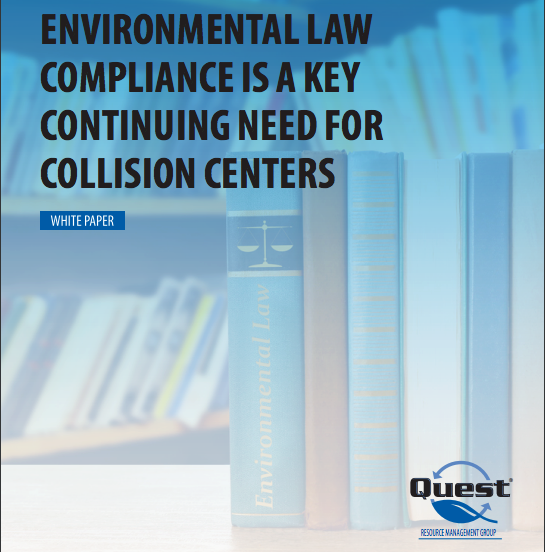White Paper: "Environmental Law Changes Impact Collision Centers"
The world of collision centers requires a lot of knowledge, hard work, problem-solving skills, and effective time management to produce positive outcomes—both for customers and facilities. These needs are even more apparent for collision centers, which take on some of the most difficult and complicated repair jobs. Fixing cars after major accidents means approaching each job as a unique and involved task that requires plenty of critical thinking, technical and environmental know-how to stay in compliance.
The Responsibility of Compliance
Of course, the responsibilities of a collision center don’t start and end with repairing a customer’s automobile. There are a wide variety of regulatory compliance needs that must also be addressed to ensure a facility can maintain regular operations and provide high-quality service to clients. A lack of oversight in this area can lead to a wide variety of negative consequences, including costly fines and the need to make significant adjustments to workflows, as well as the potential closure of the entire facility. Beyond financial penalties and other serious complications, which are faced by every type of company in a regulated industry, keeping up with relevant rules is especially important for collision centers for two reasons: the many potentially hazardous materials they handle on a regular basis and the speed with which state and federal laws can change. Consider how recent regulatory changes in California can potentially impact collision centers there.
CA Hazardous Waste Law is ONE Example
California already has some of the strongest regulatory protections in the country and has a reputation for fostering an especially broad and powerful regulatory environment. It also has been recognized several times in the past as a bellwether in terms of similar regulations being A lack of oversight in this area can lead to a wide variety of negative consequences, including costly fines and the need to make significant adjustments to workflows, as well as the potential closure of the entire facility. Even if your business doesn’t operate in California, understanding regulatory changes in that state is important for predicting future changes closer to home
Check out Quest’s latest publication detailing California’s changes in Laws that affect Collision centers and how they handle hazardous waste:










